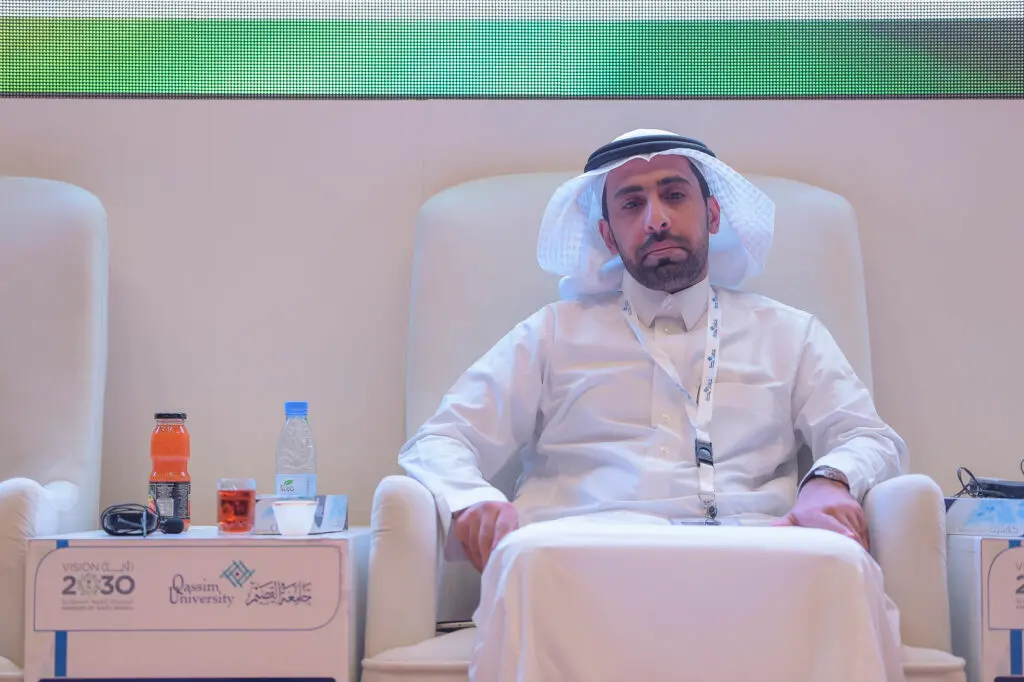During the Conference on the Role of Universities in Activating Vision 2030
Discussing the importance of improving the educational environment and bridging the gap between higher education outputs and labor market requirements
Media and Communication Center:
Participants in the "The Role of the Saudi University in Activating Vision 2030" conference, which concluded at Qassim University last week, discussed
"The session, chaired by Asmaa bint Saleh Al-Amrou, Dean of the College of Science and Arts in Riyadh Al-Khubaira Governorate, Qassim University, with the participation of Dr. Khalid bin Abdulaziz Al-Shamlan from the Saudi Management Association and Al-Jawhara bint Sulaiman Al-Fawzan from King Saud University, aimed to identify the most prominent features of strategic management requirements in its dimensions, namely: (reformulating the university strategy and analyzing the available alternatives, implementation and execution of the strategic plan, monitoring and periodic evaluation of the strategic plan), as well as identifying the most prominent features of the requirements of strategic management stemming from the Kingdom's Vision 2030 related to its administrative and educational dimensions.
In this study, the descriptive method (survey) was used. The sample consisted of (287) members of the Saudi Management Association. The study reached several results, including that the requirements of strategic management received a high degree of importance in all its dimensions to coincide with Vision 2030, and that members of the Saudi Management Association see the importance of providing administrative requirements and educational requirements for those in charge of strategic management in Saudi universities to ensure the realization of the Kingdom's Vision 2030, as well as emphasizing the importance of providing information systems that facilitate the decision-making process for those in charge of strategic management in Saudi universities, paying attention to the availability of knowledge of strategic management processes according to Vision 2030, and working to bridge the gap between higher education outputs and the requirements of S
Dr. Raghda Mohammed Al-Atiwi, a professor at Qassim University, presented An analytical studyThe study reviewed the basic concepts and some experiences in strategic planning in universities. It also reviewed the components of the strategic plan of Al-Qassim University and showed the methodology used in its preparation, and explained its distinctive aspects and how it can contribute to the realization of the Kingdom's vision 2030, enhance its developmental role, and improve its outputs and services in light of the highest quality standards in higher education.
The session also discussed a research paper on "University Governance in the Kingdom of Saudi Arabia to Achieve Vision 2030", presented by Dr. Noura bint Muneea bin Abdulkarim Al-Muneea and Dr. Tahani bint Mohammed bin Nasser Al-Khanizan at Imam Muhammad bin Saud Islamic University: Working on issuing more laws, legislative regulations, forming a legislative council under the name of the University Board of Trustees, establishing an advisory center under the name of the Academic Governance Center, taking care of the internal supervision and control system, appointing an external auditor for the university with professional competence and integrity, and activating a proposal to structure the internal and external accountability, audit and evaluation committees. The study recommended removing red tape and bureaucracy in universities by improving work procedures, which means re-engineering processes in universities so that they can meet the needs of students and the public and achieve their satisfaction, developing legislation that guarantees true independence for universities, and spreading the culture of governance.
Dr. Al-Jawhara bint Sulaiman Al-Fouzan, King Saud University, presented a research paper entitled "A proposed framework to activate the governance of Saudi universities to achieve Vision 2030, which recommended enhancing the effectiveness of universities, increasing their internal and external efficiency by creating a suitable environment for work, achieving transparency by working according to mechanisms and frameworks that are characterized by clarity and enable employees to fully exercise their work, achieving justice and equality based on efficiency and merit among university employees to obtain high performance from all its employees, ensuring their rights and interests, and promoting the participation of all university employees, whether faculty members or researchers.



